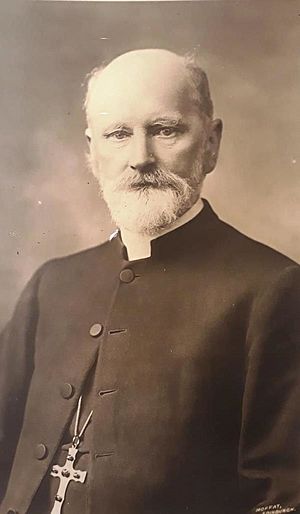Henry Montgomery (bishop) facts for kids
Quick facts for kids Henry Montgomery |
|
|---|---|
| Bishop of Tasmania | |

1889 photograph of Montgomery as bishop
|
|
| Diocese | Anglican Diocese of Tasmania |
| In Office | 1889–1901 |
| Predecessor | Daniel Sandford |
| Successor | Edward Mercer |
| Orders | |
| Ordination | 1871 (deacon); 1872 (priest) |
| Consecration | 1 May 1889 by Edward White Benson |
| Personal details | |
| Born | 3 October 1847 Cawnpore, North-Western Provinces, India |
| Died | 25 November 1932 (aged 85) Moville, County Donegal, Ulster, Ireland |
| Nationality | British |
| Denomination | Anglican |
| Parents | Sir Robert Montgomery |
| Spouse | Maud Farrar |
| Children | five, including Bernard "Monty" |
| Alma mater | Trinity College, Cambridge |
Henry Hutchinson Montgomery (born October 3, 1847 – died November 25, 1932) was an important Anglican leader, known as a bishop, and also a writer. He served as the Bishop of Tasmania for many years. He was also the father of a famous World War II general, Bernard "Monty" Montgomery.
Contents
Early Life and Education
Henry Montgomery was born in 1847 in Cawnpore, India. His father, Sir Robert Montgomery, was a colonial administrator. This means his father helped manage a part of the British Empire. Henry's family came from Ulster-Scots gentry, a type of noble family, in County Donegal, Ireland.
Henry went to two well-known schools. First, he attended Harrow School. Then, he studied at Trinity College, Cambridge, a famous university. A historian named G. M. Trevelyan once wrote that Henry was one of the few people who could jump up the college steps in one go!
Becoming a Church Leader
Henry Montgomery decided to become a church leader. He became a deacon in 1871 and then a priest in 1872. Both times, he was ordained by Richard Durnford, who was the Bishop of Chichester.
He worked as a curate in two places: Hurstpierpoint and St. Margaret's, Westminster. While at Westminster, he met Maud Farrar, the daughter of Archdeacon Frederic William Farrar. Henry and Maud got married at Westminster Abbey on July 28, 1881. They had five sons together. One of their sons, Bernard, later became a very famous military leader known as "Monty." He was a field marshal during World War II.
In 1879, Henry became the Vicar of St. Mark's Church in Kennington.
Bishop of Tasmania
In 1889, Henry Montgomery was chosen to be the Anglican Bishop of Tasmania. Tasmania is a large island state south of mainland Australia. He was officially made a bishop at Westminster Abbey on May 1, 1889. During his time as bishop, he worked hard to expand the church. He almost doubled the number of churches in his area. He served as Bishop of Tasmania until he resigned in 1901.
Later Life and Achievements
After his time in Tasmania, Henry Montgomery returned to Britain in 1901. He became the secretary of the Society for the Propagation of the Gospel in Foreign Parts (SPG). This organization helps spread the Christian faith around the world.
He also received several special honors. In 1905, he was appointed Prelate of the Order of St Michael and St George. This is a British order of chivalry, like a special club for people who have done great service. In 1928, he was given an even higher honor, becoming a Knight Commander (KCMG).
Henry Montgomery inherited his family's country home, New Park, in Moville, County Donegal, Ireland. He passed away there on November 25, 1932, and was buried in the Moville churchyard. People remembered him as someone who was "always young in enthusiasm and open vision."
Besides his famous son "Monty," Henry Montgomery also has other notable descendants. His great-grandson, Charles Montgomery, is a Canadian author. Charles wrote a travel book in 2004 called The Last Heathen: Encounters with Ghosts and Ancestors in Melanesia, which explored places his great-grandfather had visited.
Writings
Henry Montgomery was also an author. Some of his books include:
- and the Church: Being an Attempt to Estimate the Contribution of Great Races to the Fulness of the Church of God, published in 1907.
- Life's Journey, published in 1916.
- Joy of the Lord, published in 1931.
 | Isaac Myers |
 | D. Hamilton Jackson |
 | A. Philip Randolph |

